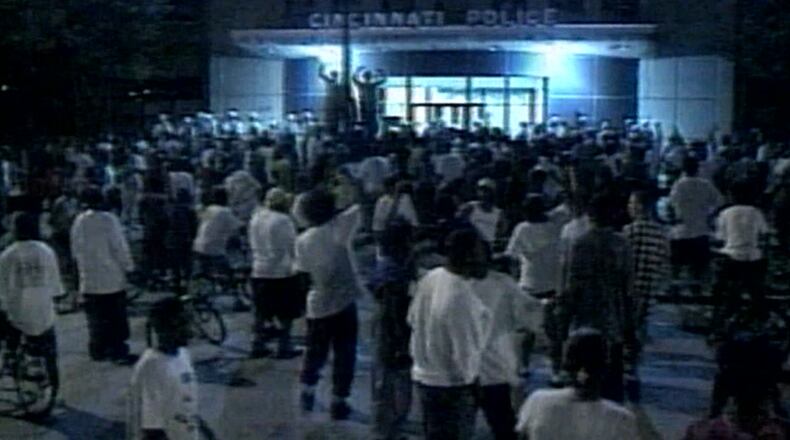CINCINNATI — In 2001, Nathaniel Snow had just started teaching in Cincinnati. That April, unrest erupted following the shooting of 19-year-old Timothy Thomas in Over-the-Rhine by a white police officer, Stephen Roach.
For Snow and other Black men at the time, what happened to Thomas felt far too personal.
“During that time period, as a Black man, you kind of live on edge because you can easily get pulled over,” Snow said.
“You have to make sure if you’re driving, you kind of like, bring no attention to yourself. And you always have to be looking over your back because at any moment things can just tailspin out of control.”
Jason Dunn, a student at University of Cincinnati in spring 2001, remembers hearing the news when a feeling of dread washed over him.
“I remember the feeling of ‘this could have been me,’” he said.
He also remembers springing into action, knocking on doors around campus, having conversations about what happened and gathering people to march.
“The fire department pulled up and the sheriffs pulled up and said ‘you guys have to go back into the dorm.’ We knew that many of our groups were a part of student government, so we knew what our rights were.”
In 2001, Howard Elliott was working at Procter and Gamble.
“I, in a few years previous, had actually gone and talked to the Sharonville police chief because one of my sons was getting stopped very often by the Sharonville police, and I was very concerned that it could turn into a Timothy incident,” Elliott said.
He said the unrest in 2001 spurred him to create a new business that focuses on hiring diverse people.
“In 2003, I actually started a business in Over-the-Rhine, and the intention of the business was primarily to hire people who look like me and give them skills that they could use and turn them into a career. You know, I think that that incident was one of the reasons,” he said.
Mike Allison, currently the principal at South Avondale School, was fresh out of graduate school in 2001. That spring, he was in his first year teaching elementary physical education and health.
To him, the civil unrest was “an awakening” to make an impact on a broader scale.
“It took me to a place where I actually went back to a second master’s program in order to pursue education administration,” he said. “Oftentimes when I got out of school, I became comfortable. I was a high-quality teacher, I was finally making a decent living, and it was going to be easy to just ride that out until my principal at that time had come to me, recognized leadership and encouraged me to go back to Xavier and get into administration.”
Two decades since Thomas’ killing, the ensuing unrest, and the signing of the Collaborative Agreement, has there been significant change? For Dunn, it’s hard to say.
“I think we have to be honest with ourselves. I believe that the Collaborative (Agreement) was a flag in the ground for the city and frankly in the country. It had never been done before,” he said of the resolution to change the way police and civilians interact.
Still, he said, there are problems with representation in Cincinnati leadership bodies.
“The facts are that there are not a lot of diverse representatives on boards within our corporations, within our city. There is not a lot of Black leadership in many of our not-for-profits and for-profit organizations, and that’s not because there’s a lack of talent: It is because, frankly, in my opinion, that the process of selecting a leader has severely been diluted some by insecurities and fear of competition,” Dunn explained.
Snow drew parallels from what happened in Cincinnati in 2001 and its aftermath to other American cities in the 1960s.
“I have a degree in Black world studies. When you look at the civil rights movement, it kind of puts you back in that type of environment,” Snow said.
In light of more recent police killings of Black men, namely Samuel DuBose, who was shot and killed by former University of Cincinnati police officer Ray Tensing, Elliott believes the situation for Black men has not changed.
“To me, the same conditions created that incident: African American men are getting stopped too often,” he said.
But Allison remains hopeful and believes we are in a better place now that Black men have “more of a voice.”
“Once we see value in one another, we’ll be at a point where we can truly take steps together as opposed to moving in separation,” he said.
About the Author
